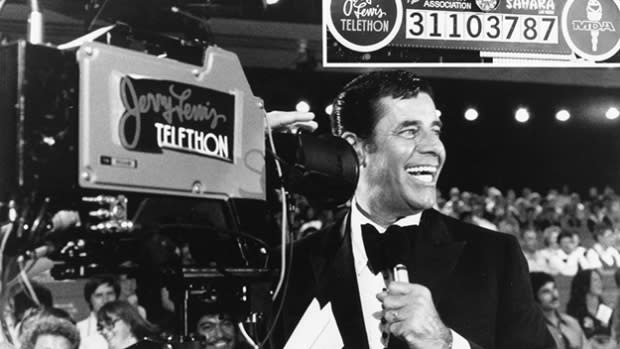Jerry Lewis and TV: A love-hate relationship

Jerry Lewis, who has died at age 91, is best known for his film work, but he always kept part of his career in television. Unlike the movies he wrote, directed, and starred in, television didn’t allow him to maintain creative control: He had to be mindful of broadcast standards of taste, of timing segments to fit in the commercials, of keeping his unruly talent tidier and neater than he liked. The result was very uneven work, but that doesn’t mean it wasn’t unique and fascinating.
Early on in his career, Lewis made a breakthrough with the nightclub act he performed with singer Dean Martin. There was a time in the 1940s when the team of Martin and Lewis were the equivalent of rock stars — their club appearances are legendary, in part because so little of those performances was ever recorded. The closest we can come to witnessing Jerry Lewis as a young wild man is in the Colgate C omedy Hour shows that Martin and Lewis hosted in the 1950s. What the duo was doing here were sketches that allowed for a certain amount of improvisation. Look at this Colgate clip, and check out the inventive slapstick humor Lewis gets into at around the seven-minute mark, doing some loose-limbed clowning upon seeing an attractive woman.
As a solo act, Lewis was frequently very funny as a guest on talk shows and variety shows, and so in the early 1960s, ABC had the idea to give Lewis his own show, which became one of the most famous disasters in TV history. ABC went all out: The network gave Lewis two hours every week; they renovated a Hollywood theater and renamed it the Jerry Lewis Theater. The Jerry Lewis Show premiered in 1963, got poor reviews and poorer ratings, and was canceled after 13 episodes. Lewis would later tell interviewer David Susskind that he knew why the show flopped: “I forgot a minor thing called ‘get funny.’” Watch the below clip from The Jerry Lewis Show and you’ll know what he means: How long can you last watching Lewis sing “When the Red Red Robin (Comes Bob-Bob-Bobbin’ Along)”? By the time this aired, Lewis knew he’d been canceled. Note his bitterness when he says to the live studio audience, “If you want to keep watching a network that would fire a father of five three days before Christmas…” and then he just shrugs.
Lewis’s most famous TV work is, of course, his annual hosting of the Muscular Dystrophy Association telethon that used to air every year on Labor Day weekend, from 1966 to 2010. Raising money for the disease was Lewis’s chief charitable act, but that doesn’t mean he always acted charitably. In its heyday, the telethon would air for close to 24 hours, at the end of which time Lewis would be exhausted and hoarse as he croaked out a version of his signature goodbye song, “You’ll Never Walk Alone.”
The Jerry Lewis telethons were extraordinary displays of massive egotism run riot, as Lewis hectored the TV audience to phone in donations. The show kept a running tally of how much was being donated at any moment, and Lewis would interrupt guests to get the latest numbers, literally screaming and yelling when the folks at home hadn’t coughed up enough for “Jerry’s Kids” — Lewis’s cringingly condescending term for the young sufferers of muscular dystrophy whom he paraded in front of the cameras.
The most famous moment — the one everyone cites — is the 1976 telethon, during which Lewis reunited with Dean Martin, from whom he’d been professionally estranged since 1956.
But that moment has nothing to do with the actual spirit of Lewis’s marathon telethons. A more accurate suggestion of what they were like can be seen here, in a clip from one in the 1970s, in which Lewis goes off on an unscripted plea to drug dealers (“people who sell cocaine and heroin”) to donate money to his cause. Why? Because Lewis, operating on pure stream of consciousness, imagined that lots of dealers (“stoned and high”) might be watching, and, as he says, “I don’t care where I get the money for my kids from.” His startling plea completed, he sucks a milk shake through a straw. Then, realizing what he’s said, he looks off-camera and says with a naughty grin, “We’ll hear about that, oh yeah!” Referring to himself, he blurts, “Super-Jew did it again!”
Lewis was always fascinating as a total creature of showbiz, hugely talented with a colossal ego, an egomaniac with an inferiority complex, a control freak who made his best comedy when he was making you think he was improvising on the spot. Anyone interested in that sort of entertainment has hours and hours of internet video of Lewis being Lewis on TV, the medium he both loved and hated.
Read more from Yahoo Entertainment:
